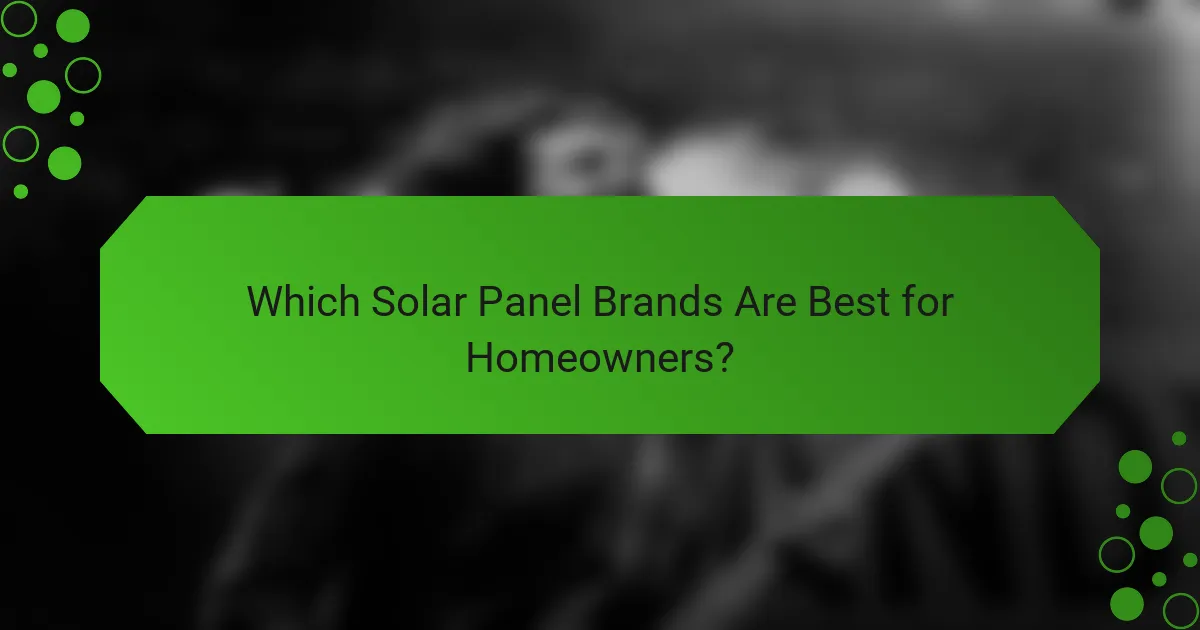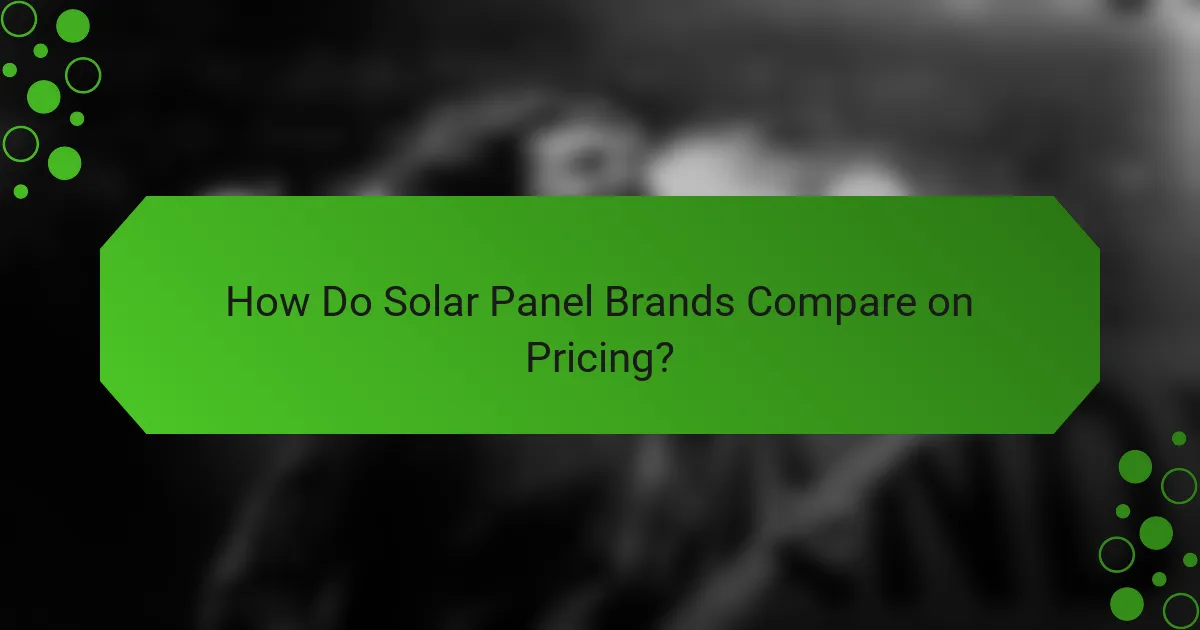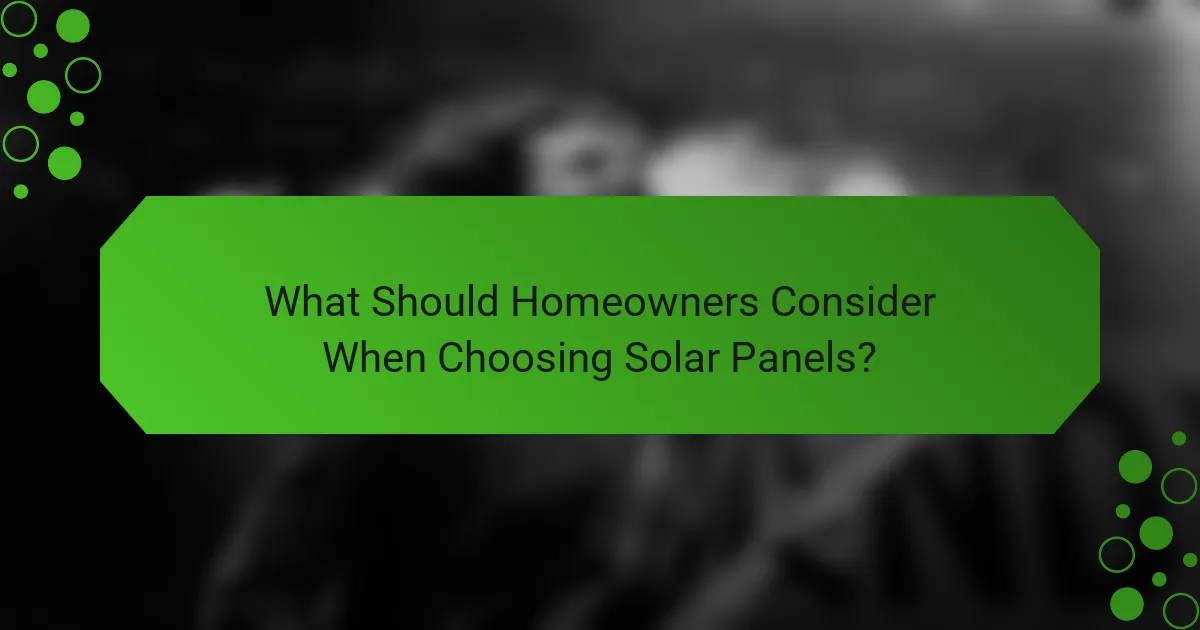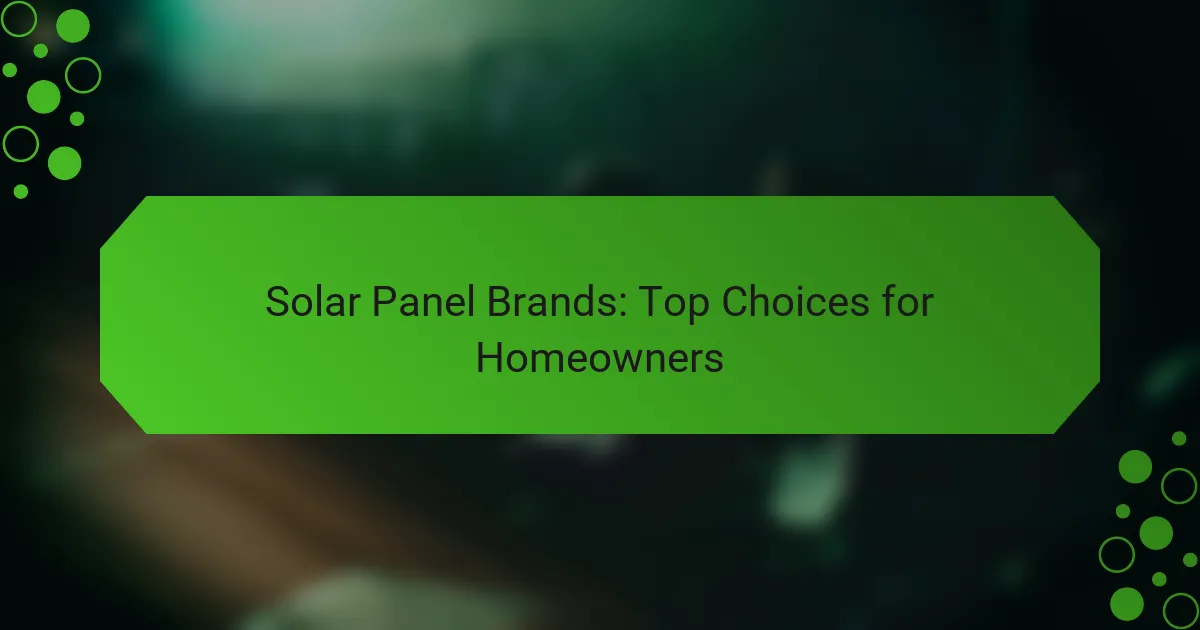For homeowners considering solar panels, selecting the right brand is crucial for maximizing efficiency and reliability. Top brands are characterized by their performance ratings, warranty offerings, and overall durability, helping homeowners make informed choices that align with their energy needs and budget. By evaluating factors like cost per watt and long-term savings, homeowners can find the ideal solar solution for their homes.

Which Solar Panel Brands Are Best for Homeowners?
Homeowners looking for solar panels should consider brands known for efficiency, reliability, and warranty support. The best choices often balance performance with cost, ensuring long-term savings and energy production.
SunPower
SunPower is renowned for its high-efficiency solar panels, often exceeding 22% efficiency ratings. This brand offers a robust warranty, typically around 25 years, which provides peace of mind for homeowners investing in solar energy.
When considering SunPower, note that while the initial cost may be higher, the long-term energy savings can be significant. Their panels are particularly suitable for homes with limited roof space, maximizing energy output.
LG Solar
LG Solar is another top contender, known for its sleek design and high performance. Their panels often achieve efficiencies in the low 20% range and come with a comprehensive warranty that lasts up to 25 years.
Homeowners should consider LG for its strong reputation in quality and customer service. The brand’s commitment to innovation means their products are often at the forefront of solar technology.
Canadian Solar
Canadian Solar offers a more budget-friendly option without sacrificing quality. Their panels typically have efficiencies ranging from 15% to 20%, making them a solid choice for homeowners seeking value.
While the warranty period is generally shorter, around 10 to 12 years, Canadian Solar panels are known for their durability and performance in various weather conditions, making them suitable for diverse climates.
Trina Solar
Trina Solar is recognized for its cost-effective solutions and reliable performance. Their panels generally have efficiencies between 17% and 20%, appealing to homeowners looking for a balance between price and performance.
Trina also offers a decent warranty of about 10 years, which can be extended. This brand is ideal for homeowners who want to invest in solar without breaking the bank.
JinkoSolar
JinkoSolar is one of the largest manufacturers globally, known for producing affordable and efficient solar panels. Their products typically range from 17% to 20% efficiency, making them a competitive choice for many homeowners.
With a warranty of around 10 years, JinkoSolar panels are a practical option for those prioritizing cost. They are widely available, making it easier for homeowners to find local installers and support.

What Are the Key Features of Top Solar Panel Brands?
Top solar panel brands are distinguished by their efficiency ratings, warranty length, cost per watt, and durability. Homeowners should consider these features to ensure they select a system that meets their energy needs and budget.
Efficiency Ratings
Efficiency ratings indicate how well a solar panel converts sunlight into usable electricity. Most high-quality panels range from about 15% to over 22% efficiency. Higher efficiency means more energy production in less space, which is crucial for homeowners with limited roof area.
When comparing brands, look for those that have been certified by the International Electrotechnical Commission (IEC) to ensure reliability. Brands like SunPower and LG often lead in efficiency ratings, making them popular choices for residential installations.
Warranty Length
The warranty length of solar panels typically ranges from 10 to 25 years, covering both product defects and performance. A longer warranty often reflects the manufacturer’s confidence in their product’s longevity and reliability. For homeowners, this means peace of mind regarding potential future repairs or replacements.
It’s advisable to choose brands that offer comprehensive warranties, including performance guarantees that ensure panels will produce a certain percentage of their rated output over time. Brands such as Panasonic and Canadian Solar are known for their robust warranty offerings.
Cost per Watt
Cost per watt is a critical factor when evaluating solar panels, typically ranging from $2.50 to $4.00 per watt installed in the U.S. This metric helps homeowners assess the overall investment required for a solar system. Lower cost per watt can lead to quicker returns on investment.
When comparing costs, consider not just the upfront price but also the efficiency and warranty, as these factors can influence long-term savings. Brands like Q CELLS and JinkoSolar often provide competitive pricing without sacrificing quality.
Durability
Durability refers to a solar panel’s ability to withstand environmental conditions, such as hail, wind, and extreme temperatures. Most top brands are designed to endure harsh weather, with many panels rated to survive hail impacts of up to 1 inch in diameter. This resilience is essential for ensuring long-term performance.
Homeowners should look for panels that meet or exceed the IEC 61215 standard for durability. Brands like Trina Solar and REC Group are recognized for their robust construction and performance in diverse climates, making them reliable options for various regions.

How Do Solar Panel Brands Compare on Pricing?
Solar panel brands vary significantly in pricing, influenced by factors such as technology, efficiency, and warranty. Homeowners should consider both the upfront costs and long-term savings when evaluating different brands.
Average Costs
The average cost of solar panels typically ranges from $2.50 to $3.50 per watt, depending on the brand and type of panel. For a standard residential system of about 6 kW, this translates to a total cost of approximately $15,000 to $21,000 before incentives.
Higher efficiency panels, such as those from brands like SunPower or LG, may fall on the higher end of this range, while more budget-friendly options like Canadian Solar or JinkoSolar may be more affordable. It’s essential to balance cost with expected performance and durability.
Financing Options
Homeowners have several financing options to consider when purchasing solar panels. Common choices include cash purchases, solar loans, and leases. Cash purchases provide the best long-term savings, while loans can help spread the cost over time.
Leasing allows homeowners to install solar panels with little to no upfront cost, but it often results in lower overall savings compared to ownership. It’s crucial to evaluate the terms and conditions of each option to find the best fit for your financial situation.
Incentives and Rebates
Many homeowners can take advantage of federal and state incentives to reduce the cost of solar panel installation. The federal solar tax credit allows homeowners to deduct a significant percentage of the installation costs from their federal taxes, making solar more affordable.
Additionally, some states and local governments offer rebates or performance-based incentives, which can further lower upfront costs. Researching available incentives in your area is vital to maximizing savings and ensuring a smart investment in solar energy.

What Should Homeowners Consider When Choosing Solar Panels?
Homeowners should evaluate several key factors when selecting solar panels, including roof compatibility, energy needs, and installation services. Understanding these elements can help ensure a successful solar energy system that meets both performance and budget requirements.
Roof Compatibility
Roof compatibility is crucial for solar panel installation. Homeowners need to assess the type, age, and angle of their roof to determine if it can support solar panels effectively. For instance, roofs with a south-facing orientation typically receive the most sunlight, maximizing energy production.
Additionally, consider the roofing material. Some materials, like asphalt shingles, are easier to work with than others, such as tile or metal. It’s also wise to check for any necessary repairs or replacements before installation to avoid additional costs later.
Energy Needs Assessment
Conducting an energy needs assessment helps homeowners determine the appropriate size and type of solar panel system. Review past electricity bills to understand usage patterns and peak demand times. This information can guide the selection of a system that meets your household’s energy requirements.
As a general guideline, a typical home may require a solar system ranging from 5 kW to 10 kW, depending on energy consumption. Consulting with a solar provider can provide tailored recommendations based on specific needs and local energy rates.
Installation Services
Choosing the right installation services is essential for ensuring the solar panel system operates efficiently. Homeowners should look for licensed and experienced installers who are familiar with local regulations and incentives. Reading reviews and asking for references can help identify reputable contractors.
Consider obtaining multiple quotes to compare pricing and services offered. A good installer will also provide warranties on both the panels and the installation work, offering peace of mind for your investment.

How Do Solar Panel Brands Rank in Customer Satisfaction?
Solar panel brands are ranked in customer satisfaction based on factors such as product reliability, performance, warranty offerings, and customer service. Homeowners often prioritize these aspects when choosing a solar panel provider, leading to varying satisfaction levels across different brands.
Top-Rated Brands for Reliability
Reliability is a crucial factor for homeowners when selecting solar panels. Brands like SunPower and LG consistently receive high marks for their durable products and long-lasting performance. These companies often offer warranties that extend beyond 25 years, providing peace of mind for users.
When evaluating reliability, consider customer reviews and third-party ratings. Websites like Consumer Reports and EnergySage can provide insights into which brands have the best track records in real-world conditions.
Performance Metrics to Consider
Performance metrics, such as efficiency and energy output, play a significant role in customer satisfaction. High-efficiency panels, like those from Q CELLS and REC, can convert more sunlight into electricity, which is especially beneficial in areas with limited roof space.
Homeowners should look for panels with efficiency ratings above 20%. Additionally, consider the temperature coefficient, which indicates how well a panel performs in high temperatures. A lower temperature coefficient means better performance in hot climates.
Importance of Warranty and Support
A strong warranty is a key indicator of a solar panel brand’s confidence in its products. Most reputable brands offer warranties that cover both product defects and performance guarantees. For example, brands like Panasonic provide comprehensive warranties that last up to 25 years.
Customer support is equally important. Look for brands that offer responsive customer service, easy access to technical support, and clear installation guidance. This can significantly enhance the overall satisfaction of your solar panel investment.
